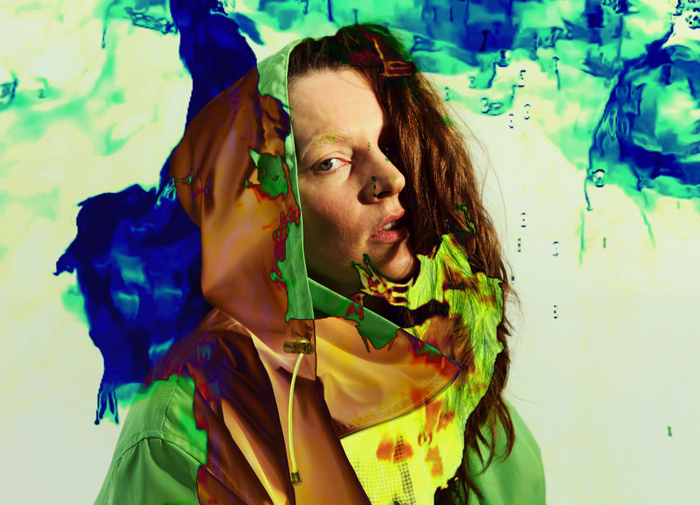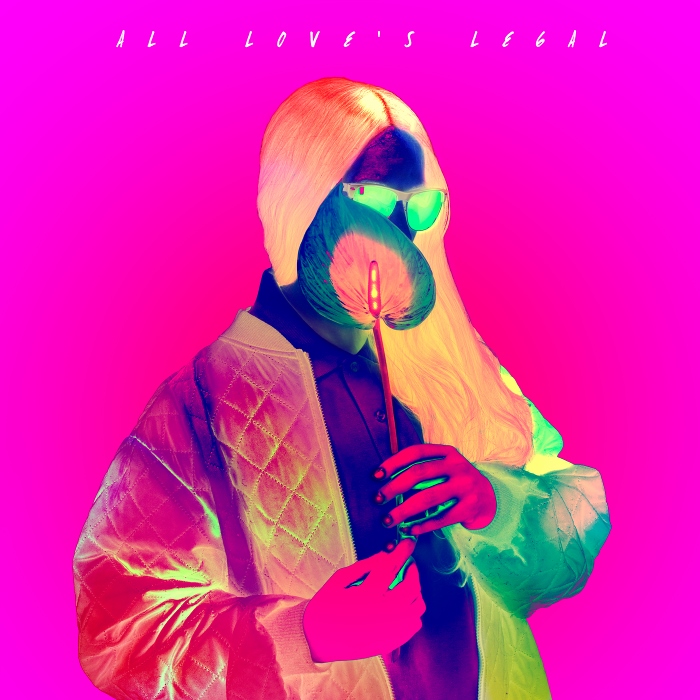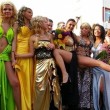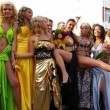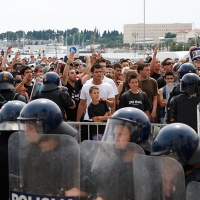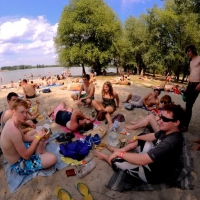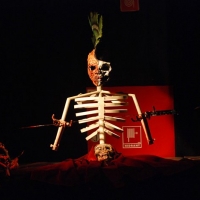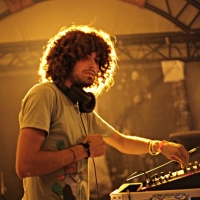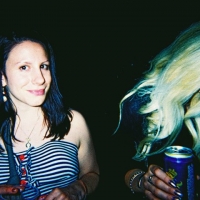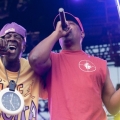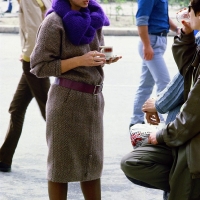The trailblazing producer and multimedia artist talks for Bturn about the music industry, Beyonce and Lagerfeld, the issues of gender and her own “queering sonic” concept, ahead of her shows in Zagreb and Skopje
Hello Balkan, get ready to be gender-bended, cause Planningtorock is coming to your town. Jam Rostron, best known for her one-woman electro/dance/pop/punk project Planningtorock is a Berlin-based music producer and multimedia artist from UK, who has in the past years undoubtedly become one of the most progressive and inspiring figures in the non-mainstream electronic music scene.
By pushing the limits and unseating the norms of music production, de-gendering the vocals using low pitch distortion, merging her lyrics that advocate for celebration of diversities with a very danceable, yet innovative and powerful sound, Planningtorock really brings us to church with her last album “All Love’s Legal”.
Many music journalists, critics and lovers agree that not since the punk era there has been a “pop” album with this kind of socio-political weight and potential. Beside its simplistic and affirming title implying there’s no illegal love (such as same sex love in most of the homophobic countries of the Balkans and other places around the globe), socio-political outreach of this album is obvious in the first twenty seconds of the intro track where Planningtorock gives a warm welcome with a tender, mesmerising, repetitive mantra: ““Fall in love with whomever you want to”. From the album title to the songs named “Let’s Talk About Gender Baby”, “Misogyny Drop Dead”, “Human Drama”, “Public Love”, “Beyond Binary Binds”, “Patriarchy Over & Out” – it’s really impossible to listen without recognising the current sexuality and gender politics situation around the world.
While the media focus rests on massive violation of human rights and promotion of anti-gay politics in Russia or Uganda, LGBT centre in Macedonia has been attacked, Belgrade’s Pride Parade in 2014. has been “defended” with thousands of police armed forces, while LGBT people in most of the Balkan countries are living stigmatised lives of fear and terror, women across the world are still battling with gender-based violence and discrimination – Planningtorock masterly brings all these battles to a whole new front in a very attractive form – international music and clubbing scene.
Planningtorock is one of those voices that are necessary for LGBT and queer people in oppressive societies on the way to equality, but also to self-acceptance. This is the music that inspires, empowers, insists on diversities, calls for tolerance and freedom, accepts differences and above all – genuinely and irresistibly makes you dance.
In a short interview before you, we talked about her “queering sonic” music concept, all-women lineups, gender (in)equality in the music world, the power of music, Beyonce, Karl Lagerfeld and fake feminism, entertainment vs passing political messages and bunch of other things that are worth questioning, exploring and pushing further more. Enjoy, resist, persist. And do not miss her shows in Zagreb and Skopje later this November.
To start with a “light” question: do you have a passion, something that you love beside producing and playing innovative and limit-pushing music?
That’s a hard question because my passion is creative language. My second passion is my friends.
Have you ever visited any of the Balkan countries (Croatia, Bosnia, Serbia, Montenegro…) or heard/read anything about their patriarchal, homophobic, oppressive societies? What bothers and intrigues you the most about this part of Europe?
I haven’t been to the Balkan’s before this will be my first time. And yes, I have read some things about this part of the world, but I don’t trust the press so I’m really looking forward to meet people there and find out how it really is on the ground : )
(How) Can music really help people unlearn heteronormative ideas of gender, sexuality and love in traditionalist and transitional societies (like ones in the Balkans)? Is it more likely to be achieved through the mainstream, dominant discourse, or by using “separatism as a means to getting equality”?
I have a lot of hope in the power of music, as it’s music and the creative people around it that has helped me unlearn and learn again : ) I have no experience in the mainstream music world, I only know this smaller, more intimate side of the music world. I think a lot about using separatism as a means to create an alternative to what’s dominant – I don’t believe in separatism. I believe in inclusivism but separatism can be a possible way to address the imbalance.
Speaking of working outside the system, would you ever sign for a major music label and if yes – under what conditions?
In order to make work on your own terms you have to stay independent and there are no major labels that are run by at least 50% women and 50% men – so no, I can’t imagine that ever happening.
Many musicians, DJs and producers today strongly believe that their job is to entertain and not to pass political messages to their audience. Where is the line between entertainment and social/political engagement in your own work? (if there’s a line at all)
I think I do both – people can dance and enjoy the music and engage with the lyrical questions or not – its up to them. Music is a flexible, limitless language, that’s why I love it so much.
Please tell me more about your “queering sonic“ concept of making music and what pushed you into it?
It’s an attempt to unseat the norms in music production and think about how sound is/or isn’t gendered – when making this new album I wanted to question every single step of the process.
What is your stance on “women only lineups” on music festivals or club nights? Does it improve the position of women in the music industry or it just further discriminates and separates female performers, using them as a marketing tactic?
When I started touring I used to think ‘I don’t wanna be booked because of my Gender?’ ‘I’m a musician and it doesn’t matter what my gender is!’. But then I started to learn that I was and still am gendered in the music world and the music world mirrors the same gender discrimination as is experienced in society – so I learnt that if I’m gendered and seen as a women then I will be discriminated against and would have to deal with that – so I now try and support female producers as much as possible because they get sidelined all the time. I recently made a mixtape for FACT which was all female – I didn’t say anything about them being all women and it was just a cool mixtape filled with diverse fantastic music made by producers who just happened to be women – so I’m interested in have female dominate festivals, show cases etc, but not make that the feature so that it can become a norm : )
Few weeks ago Chanel and Karl Lagerfeld staged a “feminist revolution” at their Paris fashion week show. Models had signs “”Feminist But Feminine” and “Ladies First” which are not really implying equality, but a privilege of a “feminine lady”. What do you think about this kind of pop culture’s exploitation of socio-political matters?
Pure opportunism, business money.
In one of your previous interviews you agreed that music has the power to enable people to see things differently, and your own music carries a lot of socio-political weight. Do you think that big pop figures with massive audiences like Beyoncé or Lady Gaga (who are representing themselves as feminists) can really contribute to the gender equality and free love issue and bring positive social change?
Beyoncé is an incredible powerful creative talent/force, great producer and composer operating in a extremely white male dominated business. I can’t even begin to imagine the fights and battles she’s had to go through and continues to go through… I think any and all attempts to open the discussion around gender and gender discrimination is great!
You are probably getting tons of fan mail, especially after the All Love’s Legal masterpiece. Has your work inspired other artists around the globe to produce music that challenge the norms, dealing with queerness, gender, sexuality, free love..? Can you mention some of your favourite artists we should keep our eyes and ears on?
Thanks! Yeah, the feedback has been so moving : ) I’m a big fan of Paula Temple – she makes amazing feminist techno, rRoxymore is a another fantastic artist that inspires me a lot – her music is so fresh! Pursuit Grooves is a one of the most unknown talented producers – I listen to her music a lot : )
As we approach the end of the interview, please tell me what is your “guilty pleasure” song – your favourite chick flick?
Haha, I don’t believe in the idea of a “guilty pleasure” because that implies that I shouldn’t like it or its not good enough… by whose rules is that made by?
Is there something you want to say, or a message that you would like to send, anything that is important to you right now? (if not, do you have a message to the young and upcoming artists?)
I’d just like to suggest this… imagine a world where your ability to do something wasn’t gendered? Your ability to make music, to drive a car, to surf or write a book was never judged through the socially invented filter of being ‘Gendered’.

